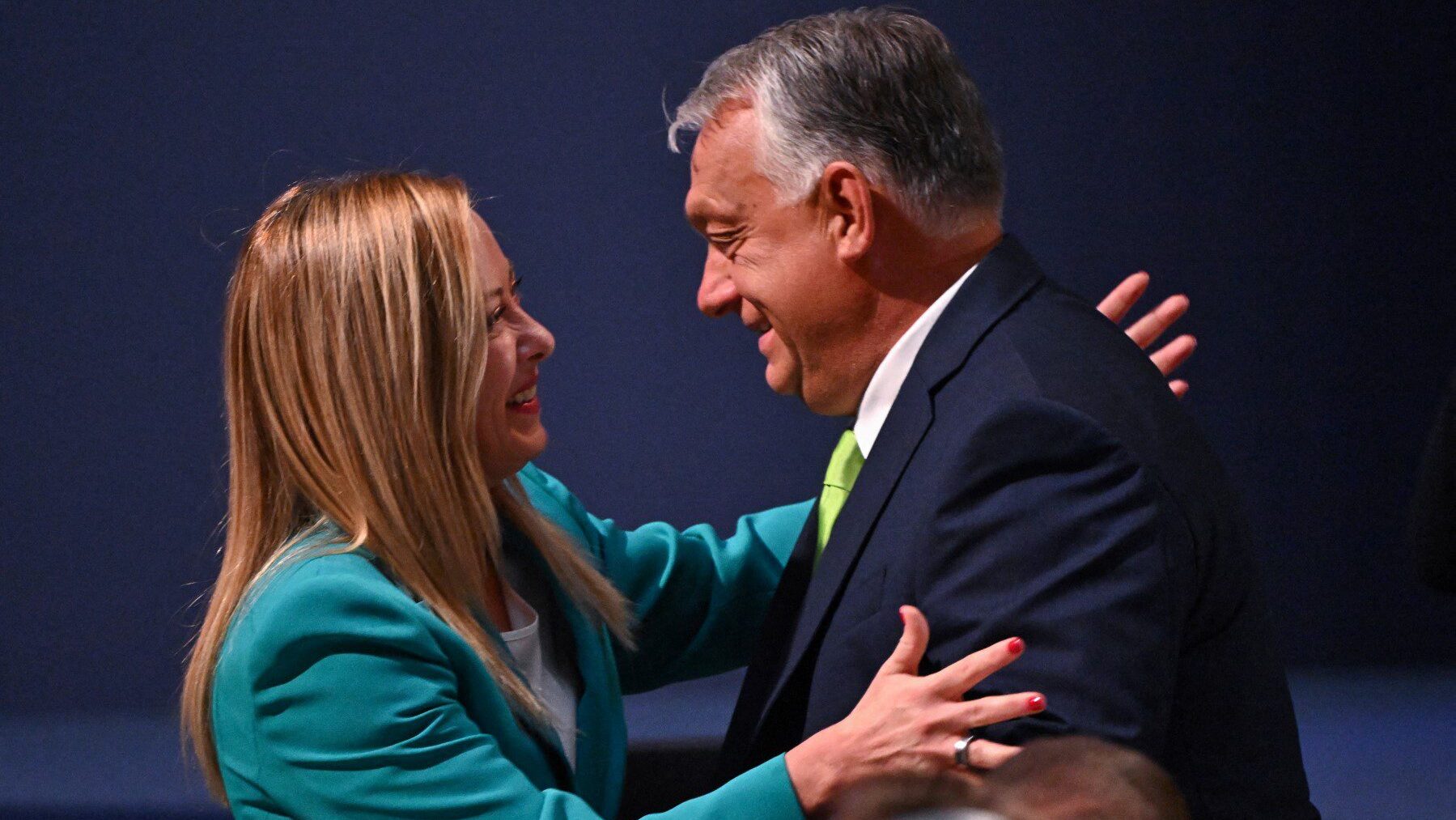
Italian and Hungarian prime ministers, Giorgia Meloni and Viktor Orbán
ATTILA KISBENEDEK / AFP
Ongoing talks aim to add the Hungarian ruling party, Fidesz, to the ranks of the European Conservative and Reformist (ECR) group after the pending EU elections. However, group leaders have made one crucial stipulation: that Prime Minister Viktor Orbán “moderate” his position on Ukraine.
Leaders within the ECR—including Italian PM Giorgia Meloni and ex-Polish PM Mateusz Morawiecki—seek a partnership that would put their national conservatives in third place in the European Parliament. According to Bloomberg
It’s no secret that the ECR is one of the most united parliamentary groups in their support for Ukraine—both for sustaining Kyiv’s wartime economy and fast-tracking its EU accession. While Fidesz would be a natural fit for the ECR in most policy areas, particularly migration and border control, Orbán’s reluctance to support Ukraine’s war efforts and his consistent calls for a ceasefire puts him on an apparent collision course with the would-be allies in Parliament.
The Bloomberg report says Meloni and Morawiecki have set a course correction on Ukraine as a condition for joining ECR. To what degree would Fidesz need to “moderate” its position, however, remains uncertain.
Recently, ECR Vice-Chair Charlie Weimers also claimed that his party, the Sweden Democrats (SD), was ready to consider “alternatives to ECR” if the group fails to continue on a clear anti-Russia path—meaning Fidesz joining without aligning with the others on Ukraine first. However, as Weimers’ post implied, SD’s real problem with the Hungarian government is stalling the ratification of Sweden’s NATO membership, an issue that Budapest promised to solve before the end of the month.
Besides, Sweden Democrats hardly have any “alternatives” to ECR in this regard. The only other national conservative, populist bloc is the Identity and Democracy (ID), whose members—including the German AfD, Le Pen’s Rassemblement National, and Salvini’s Lega—already have a much more flexible view on Ukraine.
But the same is true for Fidesz. While the ID group also extended its invitation to the Hungarians and Orbán has a good relationship with most of its leaders, ECR has parties in government and, therefore, its membership provides political prestige and legitimacy not just in the Parliament but in the Council too. Besides, Orbán would hardly settle for anything less than sitting with his two most important allies, Meloni (FdI) and Morawiecki (PiS).
ECR is also in a similar position. It’s clear that the party doesn’t want to compromise its long-standing support for Ukraine, but it cannot really turn down Orbán’s approaches either, for the same reasons. Fidesz is not only in government but maintains remarkably stable popular support domestically—something that would benefit any group in Brussels. More importantly, it’s predicted to send 12 to 14 MEPs to the Parliament, whom the ECR desperately needs if it wants to be the third largest bloc and the primary voice of national conservatism in Europe.
This is why Fidesz’ ECR membership is almost a fait accompli at this point, regardless of whether it changes its Ukraine position significantly. After all, as Morawiecki noted, differences are less important than the common goals: preserving member states’ sovereignty, controlling the external borders and curbing illegal migration, and putting democracy over bureaucracy in focus again.
“We need to join forces on many different fronts to save Europe. The ECR is open to all those who agree with us against the dominant liberal and left-wing groups that are interested in destroying the continent,” Morawiecki stressed.
